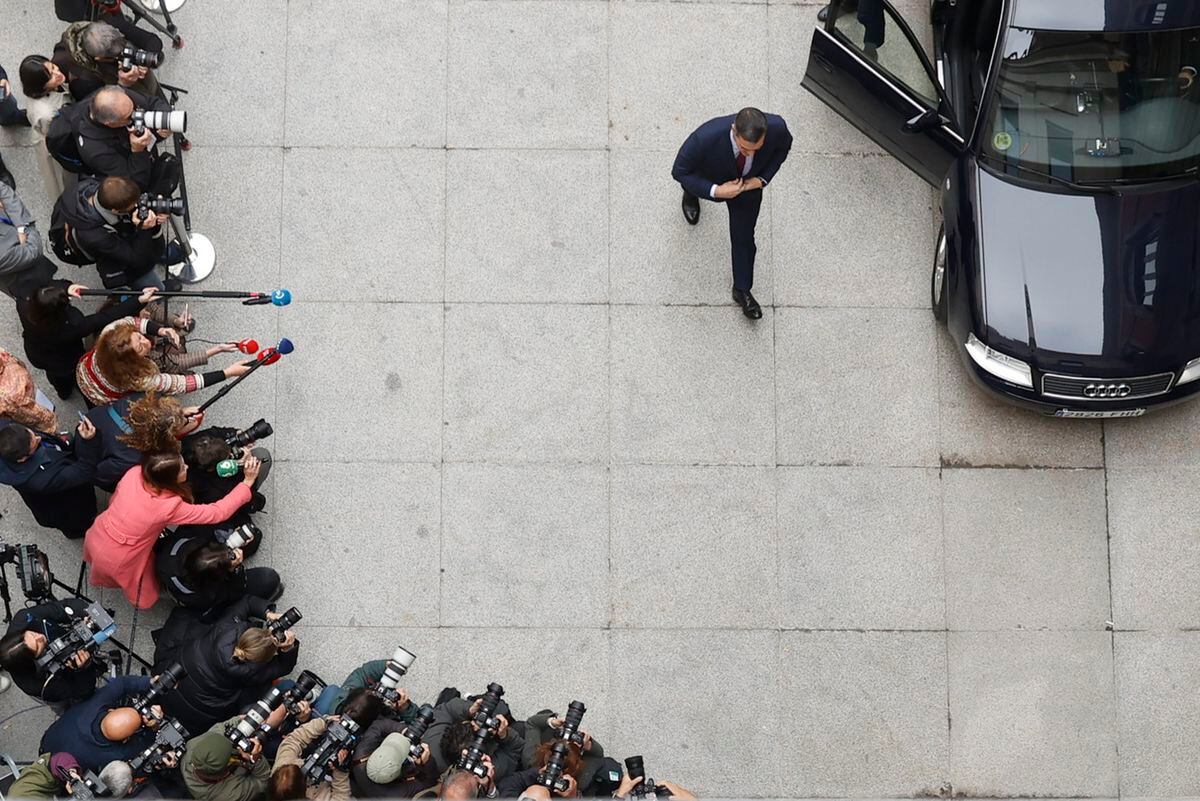Two keys marked a priori the expectation before the first day of the investiture session, held this Wednesday. The first was the long-awaited explanation of the candidate for the presidency of the Government, Pedro Sánchez, on the amnesty law agreed with the Catalan independence movement. The second is how far the climate of institutional delegitimization that is being experienced these days in Spain in the face of the passivity, if not the encouragement, of the right-wing opposition could go in the hemicycle. The ultra leader, Santiago Abascal, went so far as to compare Sanchez with Hitler on Wednesday, affirmed that the socialist leader is carrying out a coup d'état, and demanded that his regional and municipal partner, the PP, insubordinate the Senate and use its majority in the upper house to avoid processing the pardon measures. He also urged him to promote the outlawing of ERC and Junts.
The popular leader, Alberto Núñez Feijóo, hit at the contradictions of the candidate, accusing him of political corruption and electoral fraud, but said at last and in Parliament: "This is a legitimate investiture majority." Although the symphony of voices in the PP is multiple today and the general discourse continues to be installed in a dangerous hyperbole in competition with Vox, the words of the president of the party were a reassuring novelty during a very tough, fierce debate, but of absolute democratic normality in a Congress of Deputies shielded by the security forces.
Although the socialist candidate began his speech with an expression of respect for those who these days are peacefully demonstrating against his pacts, it took him an hour and 25 minutes to pronounce the word amnesty. Sánchez threaded an investiture speech designed to explain why the very difficult agreements they have managed to spin – including the grace measures that he denied just a few months ago – are justified in order to revalidate a progressive coalition government that stops the far right and the right willing to make a pact with it.
Learn more
Pedro Sánchez's investiture debate, latest live news
Thus, Sánchez outlined a global panorama marked by challenges such as the wars in Ukraine and the Middle East, the climate emergency, inequality between men and women or economic and labor inequality accentuated by the development of artificial intelligence. If democracy does not respond to insecurity, he stressed, it will turn into rage to the point of undermining democracy itself. Anger, he added, is the fodder of the far right. Before her, he presented as a retaining wall the policies of his government in the last five years, and the future of the one he is preparing to reissue, in the face of the string of "retrograde" measures that the PP-Vox alliance is already taking in municipalities and in Spanish autonomous communities and that affect above all the great obsessions of the ultras: the climate battle, measures for gender equality, the defence of the LGTBI community and immigration.
Although most of the examples were local, there was no shortage of international references — he cited Javier Milei, the ultra candidate in Argentina — to the battle between progressive and reactionary policies that is taking place in Europe and around the world. It was a polarized description of the world, in which he missed an appeal to Spaniards who do not vote for him to join them in the common project, that sociological majority that he himself evoked as a defender and beneficiary of the advances defended by his government, even though in the last elections they supported conservative options.
The story was intended to arrive loaded with these reasons at the most controversial price of his investiture: the amnesty law. There was no reasoned explanation for his change of heart in Sánchez's speech and it was necessary to wait for the debate, hours later, for him to recognise that it was the result of the elections of 23 July that generated the opportunity to propose the measures of grace: either the initial proposals were kept immovable and a repeat election was held or a "sincere and honest" negotiation with Junts was opted for. transforming "vicissitudes into opportunities" and facing problems head-on. The lack of novelty in the explanation of the amnesty and the climate of tension that surrounds it make this measure the riskiest bet of the candidate.
Beyond Catalonia, the plans for the legislature respond to the priorities of classical social democracy adapted to the challenges of today's world. His partner on the left, Sumar, called for more ambition in fiscal, industrial and housing policy. Sánchez offered to reform regional financing, speed up procedures in the Administration, speed up access to aid for dependency and promote a pact on mental health, a law on equal representation and another on family farming. He also announced free public transport for minors, young people and the unemployed, reducing the working day to 37.5 hours per week and extending the validity of the cultural bonus and the lowering of VAT on food.
If today's vote does not throw up any surprises and Sánchez is sworn in as president, the first task of his government will be the preparation and approval of the General State Budget for next year, where he will have to combine this broad social offer with the fiscal discipline imposed by the return of the rules suspended in Brussels since the pandemic.
Despite its harshness, the neatness of the debate held on Wednesday refers to a democracy that faces its problems – even the most serious ones – within the framework established by the Constitution.

